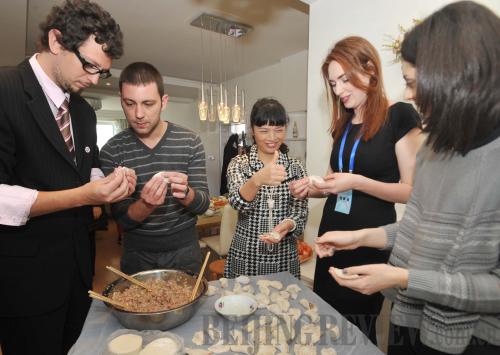|
 |
|
FRESH EXPERIENCE: Foreigners learn how to make jiaozi from a Chinese family (XINHUA) |
On the first day of class of freshmen oral English at a university in Changzhou, Jiangsu Province, I usually let the students ask me any question they want because for many of them, it's their first time to interact personally with a foreigner. Since they tend to be shy, I hand out slips of paper so they can write out their questions anonymously. The range of questions I receive is phenomenal and includes anything from "What's your favorite team in the NBA?" to "Are you in love?" and of course, "What do you think of China?" The most common question, however, is something that's important to everyone: food. Whenever I read "What's your favorite Chinese food?" I always answer without hesitation, "Jiaozi (dumplings)!"
Two years ago, when I first applied to be an English teacher in China, I had never heard of dumplings. Now they are my favorite dish. Fried, boiled, steamed or vegetarian—I order them all. I'm not the only one who craves dumplings. My Chinese students love them too. Recently, a few of my students showed me something else they like about dumplings—the tradition and the camaraderie that goes along with making them.
Jiaozi are small balls of dough that are commonly filled with meat, chopped vegetables, onions, egg and garlic. They can be cooked by boiling, frying or steaming and are usually served with a variety of dipping sauces. In China, dumplings are usually eaten on holidays or other special occasions and it is common for family and friends to join in the process of making them together.
Since I want to be able to cook Chinese dishes when I return to the United States, I asked my students for cooking lessons and they happily obliged. The next day found me on my way to the market with Ophelia, Moss, Lisa and April where they helped me to pick out and buy fresh ingredients such as cabbage, pork, garlic, eggs, flour, ginger and leeks. Then it was back to my kitchen where we rolled up our sleeves, washed our hands and got to work.
Once in my kitchen, the students were all business and I quickly moved from being English teacher to cooking student. It was fascinating to watch the way they moved around from counter to counter and bossily kept each other busy chopping, stirring and peeling. One of the most interesting things I noticed was that they used chopsticks for everything—tasting, stirring, transferring, mixing and testing. When I suggested a colander and measuring spoons and cups they didn't even know what they were! My students measured everything—oil, salt, garlic and ginger purely by instinct and practice, which made it hard for me as I was scrambling trying to keep up and write down everything they were doing so I could repeat it on my own in the future.
When we were ready to make the dumpling dough one student asked for a beer bottle. To my surprise, she ripped the label off, washed it in warm, soapy water and began to use it as a rolling pin. I learned how to feel if the consistency of the dough was just right to begin cutting out circles to shape the dumplings. The most enjoyable aspect of my cooking lesson was that it was a collective effort. The girls were obviously having a blast and while we worked we chatted about school life, family and of course, American food. Making dumplings is a very time-consuming process and the many hands made the work go quickly.
Although I couldn't shape and pinch my dumpling dough well enough to meet the group's satisfaction, I assured them it didn't matter to me since I was sure it would all taste the same. The way their careful fingers deftly shaped and squeezed the dough made it seem like they had done it hundreds of times before, and they probably had. When the dumplings were boiling (they are done when they float) we set the table and poured dipping sauce into small bowls.
As we sat around the steaming table ready to eat, I thanked my students for giving up their time to help me cook. After trying a dumpling and proclaiming it to be incredibly delicious, Ophelia, in typical Chinese modest fashion, said that it was not their best and that she shouldn't have added so much salt as she did. I protested and said it was some of the best Chinese food I had ever tasted and indeed it was. I hope that by the end of the meal the huge dent in the pile of dumplings and my bulging stomach convinced them that the cooking lesson was a definite success.
I had so much fun connecting with students and learning to make something I enjoy eating. It is moments like this when I am truly glad I made the choice to teach in China. I came not only to teach English but also to chat about life, roll out dough with beer bottles, chop ginger into tiny pieces and wrestle with slippery dumplings while clumsily using chopsticks. I just hope I can remember the process enough to be able to share it with my family and friends back home.
The writer is an American who lived in China |
